KAROL WOJTYLA
the foreigner !
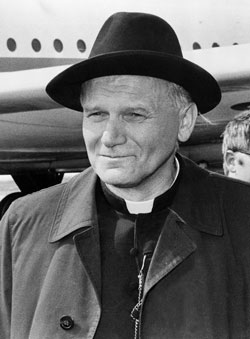 WHEN Karol Wojtyla was elected to the throne of St. Peter on October 16, 1978, he was of course the first non-Italian pope since the Dutchman Adrian VI in 1520, but it is for another reason that we consider that he was a foreigner… to the Catholic Church ! In fact our founder, Fr. Georges de Nantes, demonstrated, without ever being refuted that, in spite of appearances, he “ was not one of us ” (1 Jn 2:19). A personal doctrine inspired his pastoral practice. It may be described as the Wojtylian gnosis, since it was his thought, his conceptions, before they were spread throughout the Church with the help of the Council.
WHEN Karol Wojtyla was elected to the throne of St. Peter on October 16, 1978, he was of course the first non-Italian pope since the Dutchman Adrian VI in 1520, but it is for another reason that we consider that he was a foreigner… to the Catholic Church ! In fact our founder, Fr. Georges de Nantes, demonstrated, without ever being refuted that, in spite of appearances, he “ was not one of us ” (1 Jn 2:19). A personal doctrine inspired his pastoral practice. It may be described as the Wojtylian gnosis, since it was his thought, his conceptions, before they were spread throughout the Church with the help of the Council.
Today this accusation has to be recapitulated in order to cast full light on Pope John Paul II’s personality and his work. The purpose in doing so is to compensate for the reprehensible inadequacies of the process of beatification, then of canonisation, ensuing from its obstinate refusal to study the doctrine of the Servant of God, and for good reason.
Moreover, did not Our Lord affirm : “ For no good tree bears bad fruit, nor again does a bad tree bear good fruit ; each tree is known by its own fruit ”(Lk 6:43-44) ? As for Pope Francis, “ in whom there is no guile (Jn 1:47,) ” did he himself not admit last June 17 : “ Today, unlike in the parable of the lost sheep, the Church has one sheep and the other ninety-nine are missing ! ” ? Is John Paul II without any responsibility in this catastrophic assessment ?
AN EXEMPLARY CHILDHOOD
All the same, Karol Wojtyla’s life began like that of a predestined child. He was born at Wadowice near Cracow, Poland, on May 18, 1920 ; his parents were good Christians, his father served his country as a non-commissioned officer in the Polish army. He had only one brother, Edmund, twelve years his senior. His mother had the presentiment of Karol’s high destiny : “ This child will be someone very great, ” she said forcefully to one of her friends.
The parish priest of Wadowice testified : “ I was his prefect ; I know his life thoroughly. I can assure you that he was a boy without reproach.” His schoolmistress was full of praise for this brilliant student, an excellent, obliging friend. Of an exemplary piety, he would serve several Masses one after the other every morning, and, during his last three years in Wadowice, thus when he was between 15 and 17 years of age, he was president of the Sodality of Our Lady.
In 1929, at the death of his mother, he was admired for his abandonment to the will of God, a sentiment that he manifested again in 1932 at the death of his brother, who had become a doctor. He thus remained alone with his father, to whom, after becoming Pope, he paid a fine tribute, which is worth quoting :
“ My father was admirable, and nearly all my childhood and adolescent memories relate to him. The violence of the blows with which he had been struck opened up such immense spiritual depths within him that his sorrow was turned into prayer. Simply to see him kneeling had a decisive influence on my early years. He was so demanding towards himself that he never needed to show himself demanding towards his son : his example alone was enough to teach both discipline and a sense of duty. He was an exceptional being. ”
FROM THE THEATRE TO THE TRANSCENDENCE OF MAN
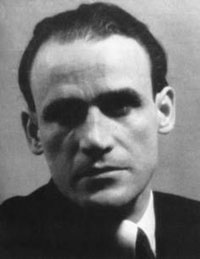
In the opinion of those who knew him at the time, this upbringing, his piety and his brilliant intelligence ought to have led him to the seminary if, around 16 or 17 years of age, he had not become passionate about theatre. He became the disciple of Mieczyslaw Kotlarczyk, the founder in Wadowice of the “ Rhapsodic Theatre, ” of which he rapidly became the leading actor.
Now, the one who would become his “ old friend ” was an odd man. He had people call him ‘ the master of the word. ’ The power of the actor, who influenced his spectators by the mastery of his acting and of his text, mesmerised him. Under his supervision, Karol understood theatre as a creative liturgy of which the actor was the demiurge through the prestige of the Word.
In fact, Kotlarczyk was a disciple of Rudolf Steiner. This great connoisseur of Kant, Goethe and Fichte was one of the masters of theosophy at the beginning of the 20th century. In 1913, he founded anthroposophy, which claimed to study spiritual phenomena as science studies physical phenomena. This all took place in an esoteric universe very far from the traditional Catholic faith of the Poles.
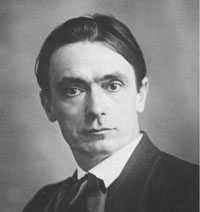
For Karol Wojtyla, this enthusiasm was not a simple passing fancy of his youth since, when he became Cardinal of Cracow, he wrote the preface to a work of Kotlarczyk, “ The Art of the Living Word, ” a text that conveniently does not appear in the inventory of his works. If the judges of the process of beatification had deigned to examine our Father’s Book of Accusation, as was their duty, they would have learned where John Paul II had acquired his consummate skill in mastering crowds. “ The master of the word ” had in fact convinced him of the strength of the perfectly mastered word, capable of arousing the sense of fraternity among men and of exalting the power of Man to equal God. “ A group of people of one mind subject to the poetic word assumes an ethical significance : the significance of solidarity in the Word (sic !), and of loyalty with regard to the Word. ”
Thus it was originally in Rudolph Steiner, through Kotlarczyk, that Wojtyla persuaded himself of the dignity of Man, meaning his transcendence.
His conception of human relationships, in particular that of conjugal love, was deeply marked by it. Steiner in fact advocated “ the practice of ‘ etheric ’ as opposed to physical love, of an eroticism that is keen because it is spiritual. This would procure for its adepts the supreme energy reserved to lovers who, through a rare form of self-mastery, remain chaste even at the most ardent moment of love. ” Here we find the explanation of John Paul II’s moral rigorism in these matters, which he always justified, moreover, by the dignity of Man.
FROM THE TRANSCENDENCE OF MAN TO FALSE MYSTICISM
In 1938 his father retired and came to live in Cracow. Karol followed him and enrolled for a course in literature at the university. He began the life of a student, always very pious but also keenly interested in literature, poetry and drama.
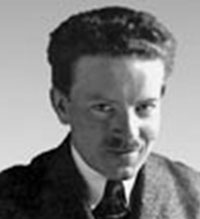
Then he met another person out of the common run in Catholic Poland and whose influence on Wojtyla is better known than Kotlarczyk’s : Ian Tyranowski. He enjoyed a reputation for holiness and it was he who detached Karol from popular religion.
John Paul II discovered St. Thérèse of the Child Jesus and St. John of the Cross. “ Contact with these two great mystics was a significant revelation for him ; it was the discovery of a new path. ” He prayed for hours at a stretch.
This evolution, however, took place in an unusual climate. In 1939, Poland had been invaded by the Germans and the Soviets. Cracow was in the German zone. In order to avoid being caught in a roundup, students became workers. Karol entered Solvay’s as a labourer in September 1940, then held several manual jobs until August 1944.
In 1941, after the sudden death of his father in his absence, Karol was alone, but not for long : Kotlarczyk and his family moved in with him, for his friendship towards Tyranowski in no way lessened Karol’s passion for the theatre and its hidden theosophy, quite the reverse. The pursuit of self-mastery, the discovery of the transcendence of man and his power, have the same consonance in rhapsodic theatre and in the alleged exalted mysticism taught by Tyranowski. Furthermore the two ‘ masters ’ sometimes met at his place for ‘ mystic Hours ’ during which Kotlarczyk and his disciples read the poems of St. John of the Cross.
According to his friends, at that time Karol was hesitating between two vocations : theatre and the priesthood. Apparently he had in no way abandoned his piety. We have overabundant testimonies concerning the long prayers of the worker Wojtyla during breaks at Solvay or at church. Yet was this still true piety ? Had it not rather turned into an exercise of self-mastery aimed at attaining the consciousness of his transcendence ? These questions can and must be legitimately asked since an authentic mystical life is not consonant with Steinerian principles.
Let us also take note of the total absence of social and political concerns in Karol Wojtyla until 1940… that is to say, during his first twenty years. This is surprising, however, when one knows the history of Poland, which at the time was dominated by the Freemasonry of Josef Pildsuski. There existed, however, an opposition party, that of Roman Dmowski, the Maurras of Poland. He was supported by Archbishop Sapieha of Cracow. The activity of St. Maximilian Kolbe and his popular “ Knight of the Immaculate, ” must not be forgotten either. His fight against the sect earned him martyrdom in a Nazi concentration camp. All of this is absent from the youth of Karol Wojtyla.
During the German occupation, nevertheless, Tyranowski awakened his interest in the history of Poland, especially in its cultural riches, and ended in exalting the struggle of the Polish people. In Karol Wojtyla, however, we find no true reflection, no political doctrine, no concrete interest in the living conditions of his compatriots, or even participation in works of charity.
THE PRIESTLY VOCATION
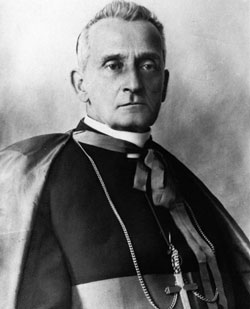
During the summer of 1942, Karol Wojtyla decided in favour of the priesthood and Archbishop Sapieha admitted him into his underground seminary. Karol was 22 years old. For a time he considered entering the Carmel, but his archbishop refused him permission, since he had immediately remarked the great intellectual qualities of the future priest.
Since he had to conceal his preparation for the priesthood, he changed nothing in his life as a worker. He only no longer took part in the rhapsodic theatre’s rehearsals which, nevertheless, were held in his home.
His biographers underline a strange fact : in 1944, when he was the victim of an accident, a mysterious Lady called an ambulance and then disappeared. He was never able to find her. To them, this appears just as miraculous as when he escaped the notorious roundup of April 6, 1944, that took place while he was at home absorbed in prayer.
After the arrival of the Soviet troops, Cardinal Sapieha gathered the seminarians in the episcopal palace. The young Wojtyla did such brilliant studies there during this troubled period that, in his fourth year, he was entrusted with the teaching of dogma and the history of dogma. Now, one of his biographers tells us, “ he [already] understood that the individual position, the spirit, and the option a man adopts should take priority over any institution external to him. It is not surprising therefore that all his fellow seminarians should have grouped themselves around him and should have come to submit their problems to him. ”
All his masters, even Cardinal Sapieha, admired him, urged him on, placed great hopes in him, without realising that his spirit was alien to theirs.
We have a proof of this in the fact that Cardinal Sapieha who, since 1911 had incarnated the traditional, national, Catholic soul of the Church and of the Polish nation, did not leave the slightest imprint on the seminarian Wojtyla, no more than did any other ecclesiastic. He hardly ever spoke of them.
IN QUEST OF HIS PHILOSOPHY
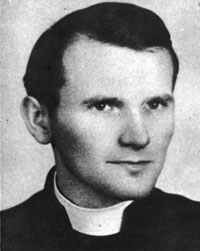
Ordained a priest on November 1, 1946, Karol Wojtyla was sent to Rome to pursue advanced studies. He took courses at the Angelicum for two years and was given very good grades. Nevertheless, his silence on his Roman masters as well as on Pope Pius XII allows us to detect, once again, a total absence of esteem.
Furthermore, in January 1947, he wrote : “ I still have some way to go before discovering my own philosophy. ” The Church obviously had nothing to teach him ; her teachings did not satisfy him. He was not a disciple… except of Kotlarczyk and Tyranowski.
In July 1948, Fr. Wojtyla obtained a doctorate in theology for a thesis on the doctrine of faith in St. John of the Cross. What was important, however, in his first years of priesthood was the study tour in France and Belgium that he undertook during the summer of 1947, at the request of his archbishop, in order to observe there the new pastoral methods, so much spoken of everywhere at that time.
His admiration for them was boundless. First for Cardijn, the founder of the YCW (Young Christian Workers) and thus of Specialised Catholic Action, for Fr. Godin, Fr. Loew and above all for the Mission of France and its democratic spirit, its “ witnessing to Christ’s presence through our whole life, and more especially, through poverty and disinterestedness. ”
Yet when people objected to him that these worker priests adhered to Communism or abandoned the priesthood to get married, he replied : “ That is only a secondary aspect of this magnificent action. ”
All the same, he was intelligent enough to realise the division that these new methods were creating within the Church between their partisans and their opponents. As for him, he adopted a different, appealing approach.
Fr. Wojtyla implemented it as soon as he had returned to Poland in the autumn of 1948. Fr. de Nantes explained it clearly : “ Fr. Wojtyla effortlessly joined full fidelity to the traditional ministry, to everyday tasks, however hard and harassing they might be, and all the devotions dear to Polish hearts on the one hand, to the prestige of novelty, the boldness of personal freedom, and the ardent torrents of love and of friendship. It was an irreproachable, conscientious ministry, but at the same time, according to his biographer, ‘ unusual, new and different. ’ Already, it was being said of him that he was not like other priests, who are like this or that… At this rate, success was opening wide the path to still further success, in the most natural way in the world without intrigue or ambition, stepping over the others with such unquestionable superiority that all bowed out before him. ”
He was first appointed curate of a small rural parish under the authority of an excellent parish priest. He became known as the best curate in the diocese. With dedication, a smile, he carried out the traditional ministry. He was particularly diligent in the confessional : “ ‘ It is the most difficult and at the same time the most vital task. ’ he said. ‘ What counts is contact with man. One must knit a dialogue with this man ; treat him seriously and with much heart. ’ ” His ministry was never mechanical or routine. The following year, he was appointed to the best parish in Cracow. He had nothing but success, above all with young people at university.
In 1951, however, his archbishop directed him, despite his resistance, towards teaching and had him undertake a doctorate in philosophy, which he obtained in 1953, in order to teach afterwards at Lublin University.
Impervious to St. Thomas, Fr. Wojtyla immersed himself instead in the universe of German philosophy. He translated Max Scheler into Polish. This study gave him an even greater interest in atheistic humanism as well as his convoluted style ; it would seem that the more abstruse the expression of thought is, the more it is certainly inspired !
At Lublin, the religious professors lived apart from the lay professors ; this was not the case for him – let us not forget that at that time, Poland was living under the jackboot of a Stalinist Communist regime. It was above all the youngest lay professors who sought his presence, and with whom he talked endlessly of philosophy, but above all of theatre.
He also drew attention to himself by his talent as a public speaker. “His sermons also took on a dramatic character, from the way he interpreted the themes and modulated his voice. He took a certain pleasure in it, quite unconsciously, because acting for him was second nature and he had an unparalleled talent for it.”
Outside his studies, then of the courses he taught, he organised youth camps where he was to say that he learned more than in books. There he was to give his full measure. It was at that time that he discovered “ his own philosophy.”
John Paul II had always affirmed that he distilled his philosophy from his vital experience. He had never learned anything from his masters or from his readings that he had not already felt or sensed on the level of experience, sensitivity or intuition. He claimed to be no more than a phenomenologist, a fascinated observer of human life, and especially in a specific sector, that of affectivity, of the sentiments, or more precisely, of love, which he said he regarded as the supreme value.
These mixed youth camps, in which he participated clandestinely, for it was scandalous in those days, were, along with the confessional, his observation station !
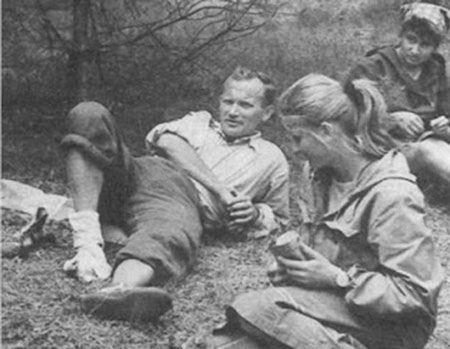
We have to insist on this group of young men and women that revolved around him. Our Father studied it in The Catholic Counter-Reformation no. 155 of April 1983. It is fascinating reading. We are enthralled by this atmosphere marked with true camaraderie, of joy – we are in Communist Poland ! – but also of piety. Every day they said the Rosary, they had Mass, they sang ; they admired the splendour of creation and continually held discussions about the search for man in his perfect stature. He enjoyed the admiration that everyone showed for him.
Our Father pointed out : “ He experienced the love of the sexes in accordance with the demands of his ecclesiastical celibacy with that self-mastery, that control of thought, imagination, passion and action, which is so remarkable, as taught to him by Ian Tyranowski. He calls this mastery responsibility. Love and Responsibility, moreover, is the title of one of his books. He is loved and he loves, without difficulties, falls or dramas and without fear or reproach. This love that stirs him motivates his whole life and all his undertakings. It is this which he intends to announce to the world. ”
Therefore, how can we summarise his philosophy ? Let us once again read Fr. de Nantes in the conclusion of this study : “ The happiness of a man’s and a woman’s union, the total expression of true love, is the most perfect flowering of each person in this world, and it constitutes that whereby the human being shares in the fullness of divine life, in accordance with the fundamental principle of his creation. For ‘ God created man in His image, in the image of God He created them, man and woman He created them. ’ (Gn 1:27) Such is the pivot of Karol Wojtyla’s entire experimental and philosophical synthesis on the theme that occupied the whole earliest part of his life : human love lived fully responsibly reveals to man the perfect stature of his Person, in the image and likeness of God. ”
“ This love could become the instrument of the love of God by its fruitfulness in the family, society, the Church. It could become Trinitarian by becoming theocentric and fruitful. Alas. No : Wojtylian love is essentially and ever more exclusively anthropocentric, autolatrous, predominantly masculine. The beloved man finds therein the term of the feminine being’s obligingness – the complaisance of her who loves him, whether she be a physical or a moral person, and in his own eyes he increases with all her admiration, not to say adoration. ”
As a consequence, Fr. de Nantes continued : “ Karol Wojtyla’s thought turned from its first object of study, love, in order to concentrate on and confine itself more and more to self-contemplation, in the exalting sentiment of ‘ man’s transcendence ’ alone, the source of which is not, as we know, pure philosophical speculation, still less Christian speculation, but ‘ phenomenological ’. It is the pure and naive self-satisfaction of the exceptional man, but intimately, secretly and deliciously sustained and animated by the adulation of complicit loves. ”
From 1969, one only has to read the titles of his books, articles and conferences to note the hypertrophy of the human me, of the masculine me, of the Wojtylian me and of his cult : “ The Person and His Act”. “ Man’s Subjectivity and Irreducibility”.“ The Transcendence of the Person in Act and Man’s Auto Teleology. ”“ The Personal Structure of Auto Determination ”.
We can only ask ourselves one question. How can such naturalism, such humanism, such autolatry co-exist in the soul of a priest, a cardinal, a pope, with the Catholic Faith, with the supernatural life, with the constant thought of God, with charity ?
Furthermore, how can the author of such a philosophy of love be canonised ? For that matter, he did not engender a single vocation in the group of young people of which he was in charge. You only have to compare it with the doctrine and work of Fr. de Nantes !
Steeped in German philosophy, concerned with pleasing the modern world, with engaging in a dialogue with contemporary intellectuals, Fr. Wojtyla got to the stage where he justified modern humanism that raises Man in his autonomous identity, fiercely independent of God. Modern man makes himself a God ; he is right to do so, Wojtyla dared to think : “ A man is free, which means that thanks to his dynamism as subject, he depends only on himself. ”
Hence his abhorrence of institutions and the exercising of authority that we shall observe. This also explains his exaltation of liberty, novelty, youth, and his refusal of all condemnation and constraint. It is a total break with twenty centuries of Christianity and the teaching of the Church based on Christ’s teaching.
This priest, destined for canonisation, went so far as to say : “ Man must discover himself, must completely reconstruct himself and must completely redeem himself (sic ! ! !) Man is an image of his God. God has made him in His own image ! Man redeems himself and discovers himself when he identifies with this image, when he discovers his own likeness to God. ” It is really man who makes himself God !
This is the essence of Karol Wojtyla’s thought, such as he conceived it in his years as a professor at Lublin. Let us note once again, for it is a mystery all the same, that he suffered nothing from the Stalinist persecutions, although his Archbishop, Eugeniusz Baziak, was imprisoned from 1953 to 1956.
A YOUNG BISHOP AT THE COUNCIL
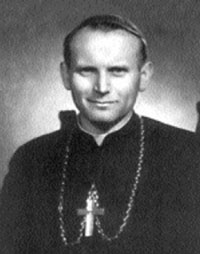
When the latter was liberated, he found Fr. Wojtyla with so many activities on hand and so much admired, that he chose him for auxiliary bishop. Consecrated on September 28, 1958, at thirty-eight years of age, he was the youngest bishop in Poland.
Destined for a great future, he continued to apply his method in this new office : he fulfilled all the traditional tasks, but in a different manner. We now know what principles inspired his actions.
For example, during canonical visits, with him authority yielded to friendship, the office dwindled in favour of a universal benevolence. Everywhere he passed, he resolved no problem, made no decision, but he ingratiated himself.
Shortly after his consecration, however, he fell ill with a sort of anaemia. The biographers remain silent on this period of darkness. He recovered by the practicing of sports, which had been recommended to him. From then on, every year, he granted himself two weeks in the mountains skiing during the winter, and a month in summer canoeing and hiking. The aura of a sportsman again increased his prestige.
On June 16, 1962, following the death of Archbishop Baziak, he was elected vicar capitular. He was the youngest diocesan administrator in Poland. The Communist government raised no difficulties, nor did it when Paul VI appointed him Archbishop of Cracow in January 1964.
As a young bishop, he attended all the sessions of the Council and played a much more important role than it seemed. He gave eight speeches. “ All his interventions were marked by a constant openness of mind. ” From session to session, he attained the reputation of a doctor of conciliar renewal – except for matters of “ sexual ” morality – and of leader of the Polish episcopate, surpassing Cardinal Wyszynski, who was plainly more conservative and even hostile to this conciliar revolution.
Fr. de Nantes clearly understood what would allow this young bishop to have the ear of the other Fathers, more than his art of public speaking :
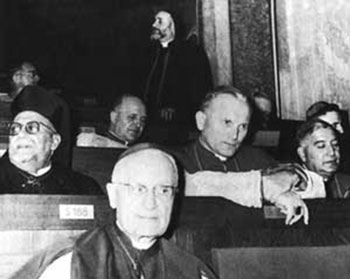
“ It has to be recognised that Bishop Karol Wojtyla was bound to make a name for himself at the Council and impose his mastery on the world episcopate, because he happened to have the theoretical conceptions that constituted the foundation of the sparse but trendy ideas of the majority of that illustrious assembly. In no uncertain terms, we say that he, more than any of the others whose names enjoyed greater fame, was one of the very first thinkers of Vatican II. This was due to the fact that he already professed in theory what the majority still only dared to support in the form of practical consequences, and even then only in isolated, incoherent and hypothetical snatches.
“ Bishop Wojtyla believed in Man ; he already had an equal cult of Man and of God. Already it was his intention to establish the entire future theory and praxis of the Church on the transcendence of man, on his dignity, his (responsible !) freedom and on his natural rights. He, and perhaps at the beginning he was the only one, transferred to man in general all the sovereign attributes and all the universal rights of the God-Man Jesus Christ. Thus he saw the Council, as soon as he realised the freedom it was to be allowed to subvert everything, as ‘ an historical stage in the Church’s self-realisation, ’according to his biographer. ”
This was particularly flagrant when it was a matter of finding a theological basis for openness to the world, which is contrary to Holy Scripture and to the whole history of the Church, for Schema XIII. It was the young Bishop Wojtyla who found the sufficiently ambiguous phrase required to deceive the majority of the Council Fathers : “ By His Incarnation, the Son of God has united Himself in some fashion with every man ”(Gaudium et Spes 22, 2). It does not say that Christ is united to every man (which would be manifestly heretical, since it would deny the necessity for baptism,) but it would allow the Council to act as though it did.
In his biography, his friend Malinsky relates this dialogue with another Polish priest who pointed out that without the Council, auxiliary bishop Karol Wojtyla would never have been made archbishop. “ ‘ You are right. Without the Council, he would have been quite simply too young for such a dignity. ’
“ ‘ And there was no shortage of eminent candidates ! ’
“ ‘ So the Council played an essential role in the Holy See’s decision. ’
“ ‘ More exactly, what Karol did at the Council. ’
“ ‘ His speeches. ’ ‘ His personal contacts. ’
“ ‘ With the people of the Vatican and with the bishops of the whole world. ’
“ ‘ The fact of his knowing several languages was also very useful to him. ’
“ ‘ The Polish bishops and the primate were able to know him better. ’
“ ‘ And his wisdom, his discretion, his knowledge of theological matters ! ’ ”
CARDINAL ARCHBISHOP OF CRACOW
Let us return to Cracow. Archbishop Wojtyla became its cardinal archbishop on June 26, 1967 ; he was at the time the youngest cardinal. In this metropolitan see, among the most prestigious of Europe, he inaugurated a new way of exercising the episcopate ; this is no longer surprising to us. Although his predecessors had different characters, they all exercised their office in one and the same spirit : in God’s name, with an authority that is not open to discussion, a divine authority. This was how Cardinal Wyszynski, the Archbishop of Warsaw and Primate of Poland, exercised authority.
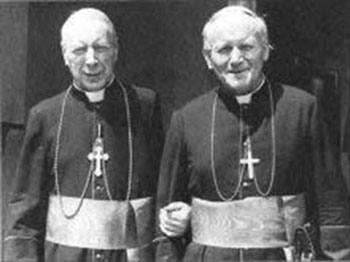
With Cardinal Wojtyla, however, “ authority softened. From being divine, it became liberal, simple and fraternal, until it appeared to be primarily human,” Father de Nantes remarked. “ It was no longer the office that dictated to the man supposed to exercise it a duty outlined in advance; it was the man who moved completely at ease in his office, following his own impulses as though they were the inspirations of the Holy Spirit. It is in this sympathetic, affable and admired man, praised to the skies by public opinion, that everyone admits recognising the authority with which he is vested and obeying the orders he gives… if he still gives any. ”
His biographer insists : “ Our Cardinal did not govern but he knew how to arouse the initiative of others. He succeeded in metamorphosing our diocese. ” This is what our Father called the overheating, He arrived, he filled everyone with enthusiasm, problems seemed to disappear, everyone was pleased, but in the end, it could be seen that nothing had been settled. The elders could think that he agreed with them because he had not disapproved of them, but the young were convinced that he supported them because he had not disapproved of them either.
Nevertheless, as our Father once again pointed out : “ An authority claiming its charm, success and popularity as a new foundation can only subsist by secreting an obsequious spirit among the notables, and by allowing revolutionary agitation to run its course. ”
This is precisely what happened : once the Communist regime had crumbled, the Church of Poland experienced the same collapse as elsewhere.
It goes without saying that the Cardinal of Cracow was an ardent proponent of the conciliar reforms. For example, he was the first in Poland to have laymen participate in diocesan synods. He considered that all of these upheavals were so many occasions to facilitate what he called the interior transformation of man. This was another ambiguous expression since it could be interpreted as each person’s sanctification, while he understood it to be the fulfilment of the human person in the full exercise of his freedom.
His biographer also clearly shows the total opposition that existed between him and the Primate of Poland on all counts, including politics. Cardinal Wojtyla, however, “ wanted to avoid a break within the episcopate, that is, the formation of Wyszynski supporters and Wojtyla supporters. Whence this absolute loyalty to Wyszynski, which was sometimes exaggerated, if there can be exaggeration in loyalty. ” He was perfectly loyal and yet he acted and thought in a quite different way ! It was perhaps virtue ; it was above all cunning : the patience of someone younger towards an elder destined to disappear before him.
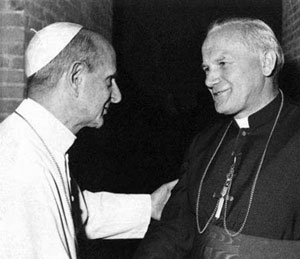
After the Council, he became an indefatigable traveller, without ever encountering difficulties on the part of the Communist authorities. Each year, he spent at least two months at the Vatican. His very active participation in the synods convened by Paul VI made him known to the entire episcopate and in particular to the College of Cardinals. He eagerly accepted all their invitations, thus travelling throughout the world.
It so happened that while everywhere else the conciliar Reformation was showing its limits and that bishops were experiencing the mass exodus of their faithful and even of a part of their clergy, Poland had succeeded in carrying out its aggioramento smoothly, without a break, without provoking the discontentment of some, the discouragement or the infidelity of the others. Under the guidance of the bishops, in particular of this young, polyglot cardinal of Cracow, the reforms had been implemented ; the Church had brought to the style of the day without losses.
Thus it was that little by little the idea spread throughout the episcopate and especially in the Sacred College, the idea that the cardinal of Cracow would know how to do in the whole Church what he had succeeded in doing so well in his diocese.
In ten years, he had made the preaching of the Polish Church evolve considerably. In the past, it used to be a matter of fighting for the Catholic Faith and the traditions of Poland. From 1970 on, the new tendency was to exhort the faithful to fight as free men who claim their rights. Imperceptibly, Cardinal Wojtyla transformed the rights of God into the rights of man.
His sermon on April 10, 1975, for the inauguration of the church of Nova Huta, build by the workers of this industrial city despite the government’s ban, illustrates this evolution. After the first completely traditional part in which he summed up the steadfast aspirations of Polish Catholicism, he then continued with a long development in favour of the rights of man by a simple transition : “ That is why we must say clearly : the fight against religion, against God, is a fight against man. ” Having begun with the rights of the Poles to practice their Catholic religion, he ended with an intellectual, abstract and universal claim for the right of man to see recognition given to his dignity, his freedom and his aspirations to a happy life. For him, this is what counted.
The following year, Paul VI invited him to preach the Lenten retreat at the Vatican, thus drawing him to the attention of all the future electors of the conclave.
It is in this retreat, however, published later on under the title “ The Sign of Contradiction, ” that Fr. de Nantes found cause for the main accusation of his Liber Accusationis. Commenting on the appearance of Jesus before Pilate, Cardinal Wojtyla taught : “ Christ is King in the sense that in Him, in the testimony that He rendered to the truth, is manifested the ‘kingship’ of every human being, the expression of every person’s transcendent character. Such is the Church’s proper inheritance. ” The royal function that Jesus claims before Pilate “ is not first of all to exercise authority over others; it is a manifestation of the kingly character of man. This kingly character is embedded within human nature, within the structure of the human personality. ”
This heresy, this blasphemy provoked no reaction on the part of the Pope or the other listeners. This is understandable, since Maritain’s personalism and Paul VI’s “ cult of man, ” had prepared minds for it.
In 1978, this cardinal, endowed with an exceptional personality, who had succeeded in implementing the conciliar reforms without difficulty in his own diocese, who was polyglot, still rather young, athletic and very pious, bore the hallmark of a great servant of the Church, destined to do much good.
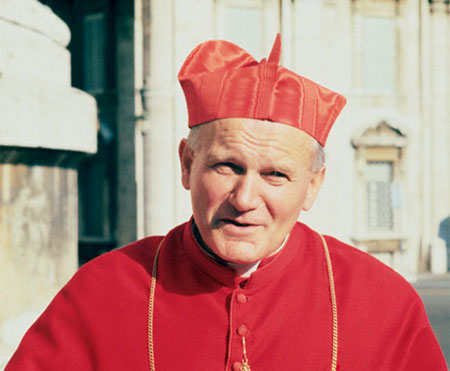
In reality, we have shown that he was already totally alien to the faith of the Church, despite his capacity for recollection and his long hours of prayer. Was it not said that he did his Way of the Cross every day ?
On August 24, 1978, the evening before the conclave that followed the death of Paul VI, he declared : “ It seems to me, and what is more it is confirmed by a whole series of opinions coming from various people, that the Church and the world stand in need of a very pious Pope. That must be his primary and indispensable characteristic, so that he can be the father of a religious society. ”
On August 26, John Paul I was elected, but he died in a strange fashion 33 days later.
Brother Peter of the Transfiguration
He is risen! n° 133, November 2013